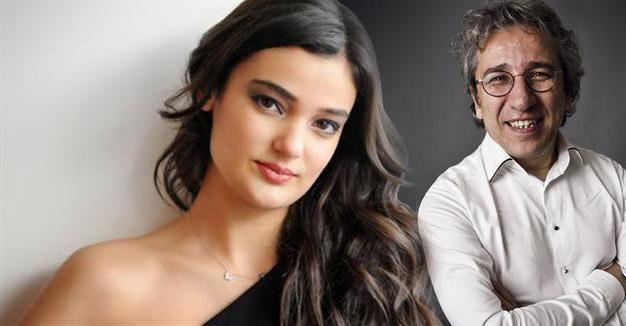IPI Turkey to act against defamation lawsuits against journalists
ISTANBUL

Over 60 people, including model Merve Büyüksaraç (L) and journalist Can Dündar (R), have recently testified in defamation lawsuits filed by President Erdoğan.
The Vienna-based International Press Institute’s (IPI) Turkish National Committee has announced that it will start a campaign against the increasing number of defamation lawsuits targeting journalists in Turkey.
“The press freedom-limiting practices of political authorities increased throughout last year,” the committee said in a statement on Feb. 27 after its general assembly in Istanbul, noting that “several defamation lawsuits that have recently been filed one after another are now being added to the picture.”
As a result, the committee said it would soon start a large-scale campaign - in cooperation with national and international journalism associations, as well as leading legal experts - to make sure that no more journalists will be prosecuted through defamation laws after criticizing political authorities in Turkey.
“Holding the public trust requires public servants to accept scrutiny of their actions, particularly when criticism centers on issues of public interest, such as alleged wrongdoing,” Steven Ellis, IPI Director of Advocacy and Communications, told the Hürriyet Daily News on Feb. 27.
“This increasing stream of lawsuits suggests that the president isn’t willing to accept scrutiny, which is a dangerous development for democracy,” he added, referring to Turkish President Recep Tayyip Erdoğan.
Erdoğan has filed criminal complaints citing “insult” against more than 60 people in Turkey since he was elected to office in August 2014. It is not only journalists bearing the brunt of the cases - even a beauty queen is among those who are currently on trial.
Merve Büyüksaraç, a former Miss Turkey, faces up to 4.5 years in prison on charges of insulting Erdoğan, after his lawyer lodged a complaint in November 2014 against a satirical poem taken from a magazine and posted on her Instagram site. Büyüksaraç was briefly detained last month, with prosecutors citing defamation laws.
“Laws that grant political leaders with greater protection from criticism than the average citizen are an open invitation for abuse,” Ellis said on Feb. 27, urging Turkish lawmakers to take immediate steps to abolish such laws and bring Turkey in line with international standards.
Prominent journalist testifies over ‘insult’The Büyüksaraç case is the latest in a string of recent incidents in EU membership candidate Turkey, where protesters, as well as journalists, have found themselves facing criminal lawsuits or jail time after being accused of insulting or slandering Erdoğan, according to Agence France-Presse.
Prominent Turkish journalist Can Dündar, editor-in-chief of daily Cumhuriyet, was present at the Istanbul Çağlayan Courthouse on Feb. 26 to testify on charges of “insulting” Erdoğan.
Dündar dismissed the use of lawsuits as a deterrent against journalists, who he vowed would “not be intimidated and would continue to write.”
In another case that attracted much attention, teenage schoolboy Mehmet Emin Altunses will go on trial on March 6 on charges of insulting the president in a speech in the conservative Anatolian city of Konya.
Four young people were arrested in four days last week on different charges of insulting the Turkish strongman during street protests this month.
Erdoğan has long been accused by critics of being increasingly authoritarian and intolerant of criticism.
In the past, he sued a newspaper cartoonist for portraying him as a cat entangled in a ball of wool.
